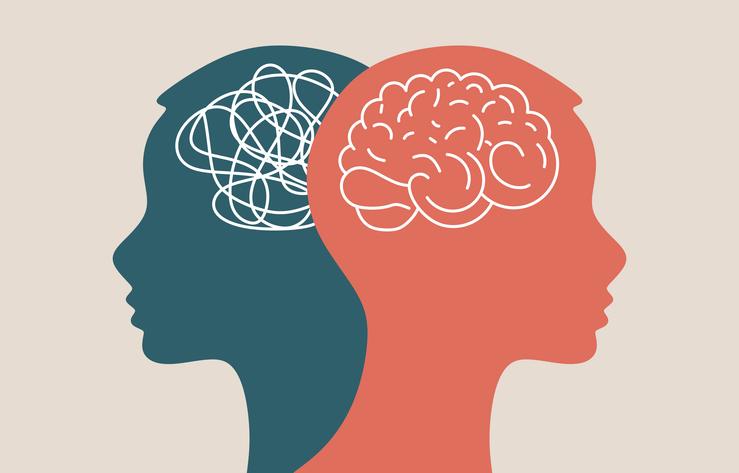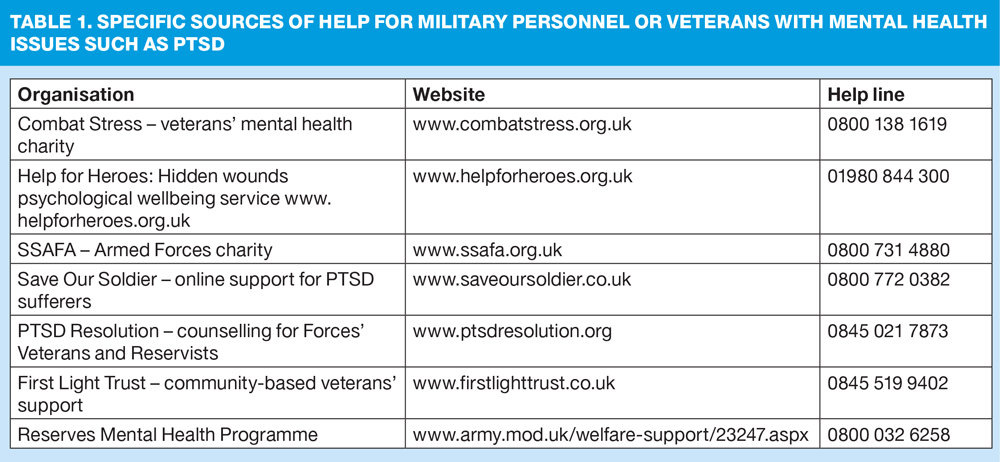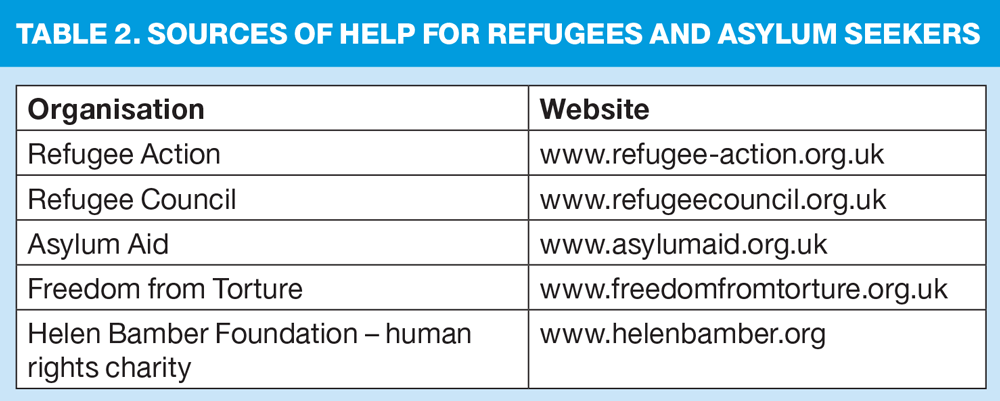
A Practice Nurse guide tocommon mental health conditions: Post traumatic stress disorder
Dr Mandy Fry
Dr Mandy Fry
Portfolio GP & Oxford GP School Senior Programme Director (Retainers and GP I&R Scheme)
Many people with PTSD suffer from the disorder for months or even years before seeking help but there is a valuable role for the practice nurse in ensuring that they do not suffer in silence
Post traumatic stress disorder (PTSD) is a mental health problem that develops following exposure to a stressful event or a situation of an exceptionally threatening or catastrophic nature, which is likely to cause pervasive distress in almost anyone.1 Being exposed to such an event can challenge our belief that life is fair and affect our sense of security and safety. What this means that nearly everyone in such a situation will suffer some form of acute stress reaction, but for a minority this will go on to cause significant on-going problems. It is thought that about 25 – 30% of people who are exposed to such an event will go onto develop the disorder.
Recently PTSD has been much more in the public eye following the wars in Iraq and Afghanistan. Despite the hype, the incidence of PTSD amongst veterans is approximately 25% so is comparable to that of the general population who have suitable triggering exposure.2 What the media exposure does seem to have done, however, is to decrease the time it takes for veterans to seek help, from previously being about 13 years to, following the Afghanistan conflict, just 18 months.3 The military have also become much more proactive in screening for the possible development of PTSD with their Trauma Risk Management (TRiM) scheme,4 whereby individuals in military units are trained up in the management of people after traumatic incidents. This scheme taps into the idea that soldiers are much more likely to confide in their mates rather than in strangers.
Consider Will.
Will, a 42 year old veteran, comes for an NHS health check. As part of your screening questions you discover that Will is drinking 1-2 bottles of wine a night. When you suggest that this might be considered a harmful level of alcohol intake Will tells you that it is the only way he can get to sleep. Without the alcohol he gets recurring nightmares of some of the things he saw during his military service.
One of the main hallmarks of PTSD is that the individual re-experiences symptoms in a vivid or distressing way, and this often occurs in the form of flashbacks or nightmares. Sufferers may then develop strategies to cope with their symptoms and can often turn to alcohol or substance misuse. This seems to be particularly the case for veterans.5 Addressing the alcohol misuse is obviously important but this is unlikely to be successful without dealing with the underlying issues. NICE1 recommends trauma focussed psychological therapy, such as trauma focussed cognitive behavioural therapy (CBT) or eye movement desensitisation and reprocessing (EMDR). Some local NHS trusts have specific units specialising in the treatment of veterans, which can be accessed via your local Improving Access to Psychological Therapies (IAPT) service. There are also a number of charities that work specifically with military personnel and veterans (see Table 1). There is a minimal role for medication but, given that Will is effectively self-medicating with alcohol, there may be a place for short-term hypnotic therapy. It is also worth considering whether Will’s family are also in need of support as PTSD can be very challenging to deal with for close friends and partners.
Of course it is not only veterans who can suffer from PTSD. Let us consider another patient, Alice, who has no history of military experience…
Alice is a 32 year old woman who brings her six week old son, Charlie, in for his routine childhood immunisations. You ask Alice how she is getting on and she says she is not coping very well as she feels detached from Charlie and from her husband, John. You then see that Alice had quite a traumatic childbirth experience, resulting in a high forceps delivery and that Charlie needed resuscitating after the delivery.
Emotional numbing and a feeling of detachment from other people are other symptoms that may be suggestive of PTSD and traumatic childbirth is a recognised trigger event for some people. However, it is only six weeks since Alice gave birth and so it may be appropriate to watch and wait to see if her symptoms get better over the next few weeks. You could explore with Alice whether or not her symptoms are resolving as this may help to determine if she is simply suffering from an understandable acute stress reaction or if she will go on to develop PTSD. If Alice’s symptoms persist then she too may benefit from some trauma focussed psychological therapy. Early intervention is key as otherwise Alice’s mental health may affect the development of a good relationship with Charlie. It may also affect her decision-making regarding having further children as another feature of PTSD is that sufferers tend to try and avoid reminders of the trauma. Another issue that it is helpful to be aware of is that sometimes people respond to traumatic events, particularly in childhood, by suppressing their memories of such events. So it is possible that Alice’s symptoms may be being exacerbated by some childhood trauma, such as childhood sexual abuse, which she has previously suppressed.
Let’s take another patient, Khalid…
Khalid is a 38 year old man who has very limited English. He has recently come to the UK as a refugee from Syria. He comes to see you in the minor illness clinic with a possible chest infection. When you go to examine Khalid’s chest he flinches and draws away from you. You notice that his back is covered with scars.
Khalid’s flinching and withdrawal represent another common symptom of PTSD where sufferers show hypervigilance for threats and an exaggerated startle response. In Khalid’s case this is probably exacerbated by his poor English language skills as this would have made it more challenging for you to explain what you were about to do, and to reassure him that you did not intend to harm him in any way. Unsurprisingly, PTSD is a very common condition among refugees and asylum seekers with some studies suggesting that up to 60% of such individuals are affected. Interestingly, it seems that the incidence of PTSD among victims of violence and torture remains at the same level as that for other potential triggering events (i.e., about 25%) but that those who do develop PTSD are more likely to seek to escape their situation by claiming asylum.6 The presence of scars on Khalid’s back certainly suggests that he may have been the victim of torture and this would be an obvious precipitant for his symptoms.
Again, trauma focussed psychological counselling would be the most appropriate response to help Khalid move forward. However, the situation is complicated by cultural and language issues that you need to be sensitive to. Clearly in this case Khalid would benefit from talking to someone in his own language if at all possible, or at the very minimum using a professional interpreting service. He may also prefer to talk to a male practitioner, as he could be ashamed of what has happened to him, or feel unable to describe the full details of it to a woman. Khalid may also have on-going concerns about the safety of friends and relatives that he has left behind in Syria, and this may influence his willingness to talk about what he has experienced. Khalid’s rights to healthcare, beyond emergency treatment, are also dependent on what stage he is at in applying for refugee status.7 There are, however, a number of organisations (see Table 2) that are designed to help refugees and asylum seekers and they would be worth signposting Khalid to. Not only will they help with accessing appropriate counselling but also they may be able to provide him with legal advice to help with his application and advice regarding what benefits he may be entitled to. As well as these national organisations you may find that there are local resources you could find about for such situations, particularly if you work in an inner city environment or near a detention centre.
As can be seen from the three cases, the mainstay of treatment for PTSD is trauma focussed psychological counselling.1 Usually this is provided on an individual outpatient basis, on a regular, at least weekly basis. Sessions last 90 minutes and it is important to maintain continuity of therapist throughout the programme, which is usually of 8 to 12 sessions initially. However sometimes PTSD is complicated by other mental health problems, such as depression or substance misuse. In these instances, treatment of the PTSD may well help alleviate the co-morbidity but some individuals may be too unwell to benefit from psychological therapy without prior treatment of the other condition. For such individuals there may be a limited role for medication such as mirtazapine, amitriptyline or paroxetine. The other situation in which medication has a role is for individuals who are continuing to be subject to on-going precipitating events. An example of this might be a victim of domestic violence who is unable, or unwilling, to extricate themselves from the situation. Also there may be a role for short-term hypnotic therapy for those who are struggling with sleep disturbance, such as Will.
PTSD can be an incredibly disabling condition for sufferers, yet many individuals do not seek help for many months, if not years. Sometimes this means that sufferers cannot believe that there can still be any effective treatment, given how much time has passed. However, the duration of the disorder does not seem to be an impediment to benefitting from effective treatment. So helping to identify potential sufferers and signposting them to appropriate help are important roles for all healthcare practitioners – it would be so much better if they did not just suffer in silence.
REFERENCES
1. NICE CG 26. Post-traumatic stress disorder, 2005. https://www.nice.org.uk/guidance/cg26
2. Combat Stress. Myth busters http://www.combatstress.org.uk/veterans/myth-busters/
3. Sorfleet N. PTSD is terrifying but speed of UK veterans seeking help is promising, 2014 http://www.theguardian.com/society/2014/may/12/ptsd-terrifying-speed-afghanistan-veterans (accessed 8 Jan 2015)
4. Trauma Risk management http://www.army.mod.uk/welfare-support/23245.aspx
5. Fear NT, Jones M, Murphy D et al. What are the consequences of deployment to Iraq and Afghanistan on the mental health of the UK armed forces? A cohort study. The Lancet 2010; 375 (9728): 1783–1797.
6. Kinzie JD. Immigrants and refugees: the psychiatric perspective Transcultural Psychiatry 2006:43; 57
http://www.uk.sagepub.com/thomas2e/study/articles/section3/Article79.pdf
7. Department of Health. Guidance on providing NHS care treatment for asylum seekers and refugees, 2012
https://www.gov.uk/government/news/guidance-on-providing-nhs-treatment-for-asylum-seekers-and-refugees
Related articles
View all Articles

